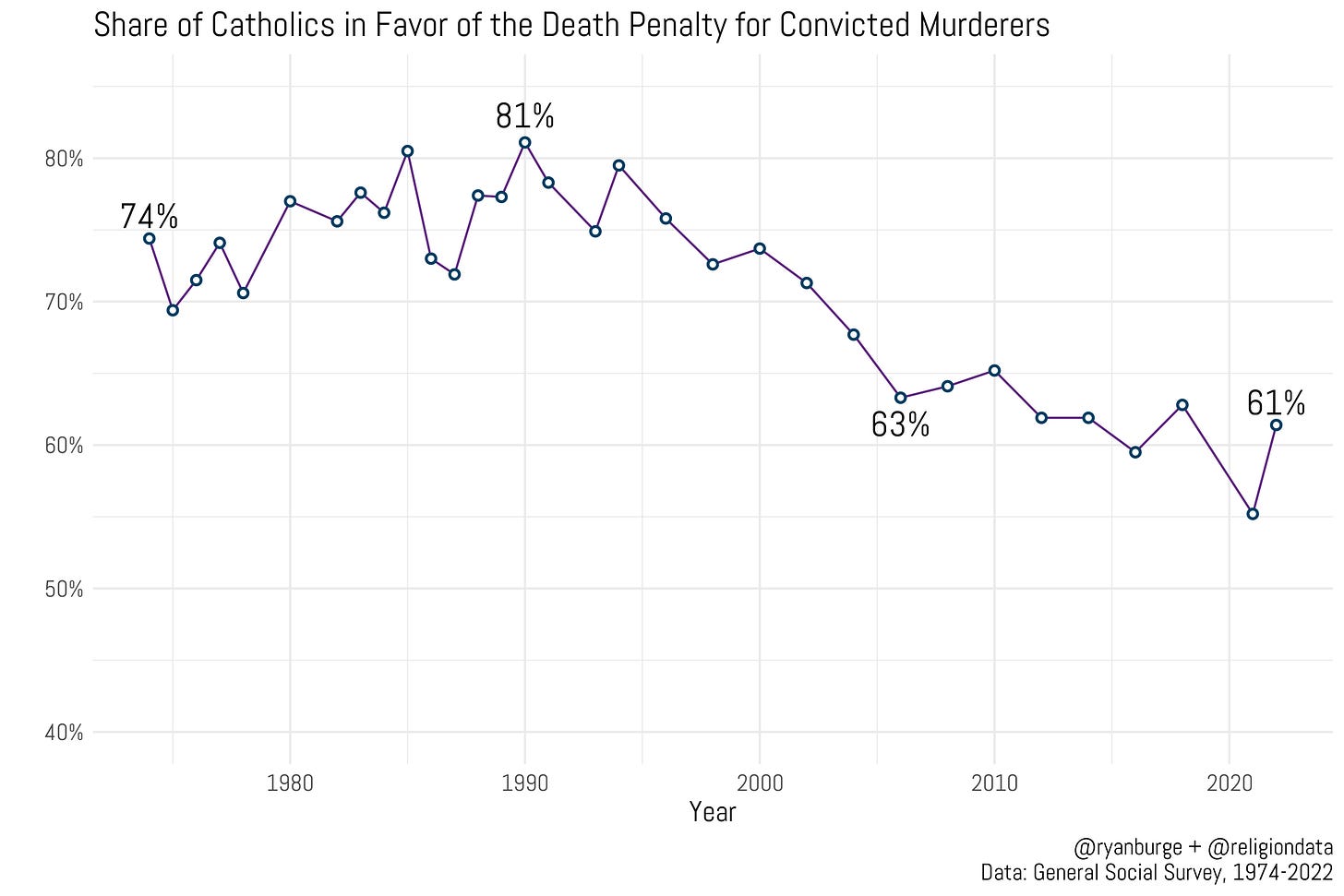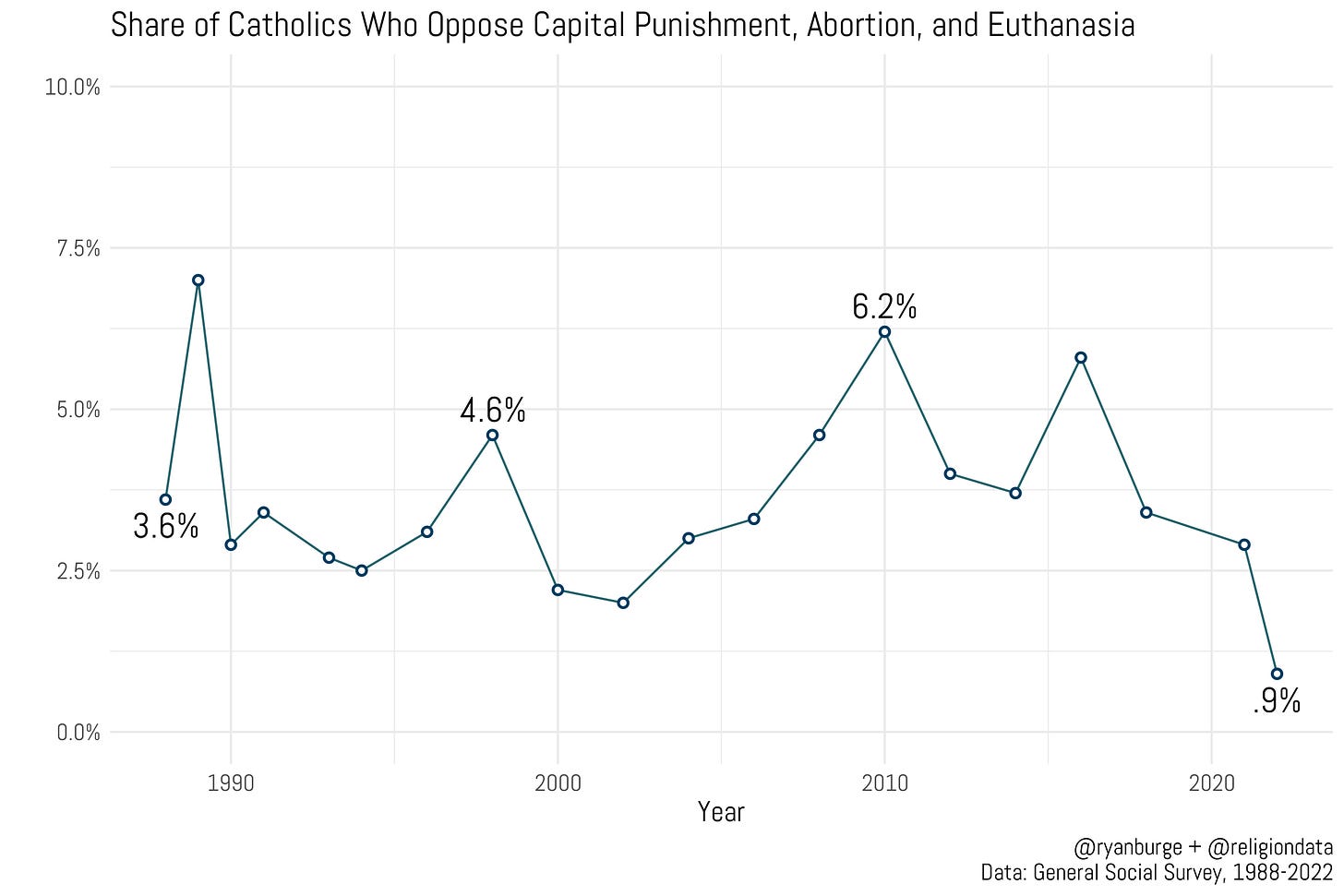Cafeteria Catholicism?
How Many Catholics Agree with the Church's Position on Hot Topics?
This post has been unlocked through a generous grant from the Lilly Endowment for the Association of Religion Data Archives (ARDA). The graphs you see here use data that is publicly available for download and analysis through link(s) provided in the text below.
I always find it fascinating when religious leaders show up in a non-religious context. It’s one thing for a pastor or priest to speak to their flock from the pulpit. A religious leader engaging in dialogue in a non-religious setting is something else entirely.
My attention was piqued when someone posted a clip of the Archbishop of Washington D.C., Wilton Gregory’s appearance on Face the Nation a few weeks ago. The archbishop described President Joe Biden as “a cafeteria Catholic.” His definition of the term is, “(one) who choses that which is attractive, and dismiss that which is challenging.”
Bishop Gregory referenced issues related to “life” but did not specifically mention abortion. But any casual viewer would quickly understand that this was a larger discussion about pro-life/pro-choice. There was a bit of back and forth after this with the panelists discussing how one’s private faith can sometimes conflict with their public policy positions, which I thought was well articulated and a bit more nuanced.
But the reason that this statement really stuck with me is that it’s not just many Catholics who disagree with the teachings of the church - in fact, if you look at the data, it’s nearly all of them. The vast, vast majority of members of the Catholic church reject the teachings of their faith on all kinds of issues.
Let me show you what I mean.
The Catechism of the Catholic Church is exceedingly clear on abortion.
“Since the first century the Church has affirmed the moral evil of every procured abortion. This teaching has not changed and remains unchangeable. Direct abortion, that is to say, abortion willed either as an end or a means, is gravely contrary to the moral law." Paragraph #2271.
Yet, if you look at the stated opinion of rank and file Catholics on abortion, there’s clear majority support for elective abortion in almost every circumstance. For instance, at least three quarters of Roman Catholics favor a woman’s right to obtain an abortion if she became pregnant due to a sexual assault. Nearly the same share are supportive of abortion if the child has a serious birth defect.
The GSS has been asking questions about abortion if the woman wants no more children for decades. From the 1970s through the 1990s, the share of Catholics who would allow an abortion in that circumstance was right around 40%. That share dipped just a little bit through the 2000s but has significantly increased in the last decade or so. Now, about half of Catholics would support an abortion in that circumstance. The trend line is largely the same when Catholics are asked about electing an abortion in the situation where the woman is not married. Now, about half of Catholics would support the right of a woman to obtain a legal abortion in that case.
But there are other issues related to the sanctity of life where there is a divide between the Catholic Church and the laity. The United States Conference of Catholic Bishops has always been clearly opposed to the use of the death penalty, as well. They have stated, “No matter how heinous the crime, if society can protect itself without ending a human life, it should do so.” The General Social Survey has asked about the permissibility of the death penalty for convicted murders since 1974.
The first time that question was asked, 74% of Catholic respondents favored capital punishment for those who had been convicted of murder. Over the next decade or so, support for the death penalty continued to rise - hitting its peak in 1990 at 81% of Catholics in favor. But from that point forward, support for the death penalty has consistently declined. By the late 2000s, support for capital punishment hovered around 65% of Catholics.
In the last few years, there’s some evidence that capital punishment has become less palatable to Catholics. In fact, in the survey collected in 2021, just 55% were in favor. However, that numbered rebounded just a bit in 2022 to 61%. But there has not been a time in the last 45 years in which a majority of Catholics have affirmed the teachings of their faith on the issue of capital punishment.
The other issue which is easily assessed by looking at the GSS data is euthanasia. In this case, the GSS asks if someone should have the right to take their own life if they are suffering from an incurable disease. This question was asked for the first time in 1977.
In the 1970s, support for euthanasia was noticeably low. Just 36% of Catholics were in favor in those early surveys. But by the late 1980s, opinions among Catholics had shifted pretty significantly. By 1990, about three in five Catholics would allow someone with a terminal disease to take their own life. And that percentage stayed relatively constant for the next two decades.
While there was a decline in support between 2008 and 2012, there was another surge in support in the most recent data. By 2022, about 70% of Catholics were in favor of euthanasia. That was basically double the share who supported the practice in 1977.
To simplify this analysis, I calculated the share of Catholics who did not support abortion for any reason, those who opposed capital punishment and also opposed euthanasia in the previously described scenario. Here’s the end result.
It’s rare to see a year of the survey in which 5% of Catholics agree with the Church’s teaching on just these three issues. In 1988, it was just 3.6% of all Catholics. The high water mark in recent years was in 2010, when about 6% of Catholics held to a consistent ethic of life. In the last few years, that percentage has dropped below 3%, and in the 2022 data just one Catholic in one hundred met these three criteria.
That’s not to say that Catholics are the only religious group that consistently rejects the teachings of their church. Ligonier Ministries has been conducting an annual poll that asks very specific doctrinal questions. Among evangelicals who took part in this questionnaire, here are some notable findings:
26% did not believe that the Bible was literally true.
56% believe that “God accepts the worship of all religions, including Christianity, Judaism, and Islam.”
43% said that “Jesus was a great teacher, but he was not God.”
57% agreed that, “everyone sins a little, but most people are good by nature.”
And let me emphasize this point - this is among evangelicals, not the general public.
A common thread that runs through the discourse about religion is often focused on purification. You can see it in several circles right now. Some in the Southern Baptist Convention believe that the reason for the membership decline is because a few churches have moderated on things like women in ministry. Lots of traditional Catholics point to Vatican II as the reason for the huge decline in Mass attendance among the laity.
“If only we could return to the pure tenets of the faith,” is a constant refrain. But, often that’s harkening back to an era that I’m not sure ever existed. There’s always been dissent, and there’s always been a diversity of viewpoints in groups as large as the SBC and the Catholic church. To expect conformity of belief is to point toward a standard that is unrealistic.
Code for this post can be found here.








As a Catholic priest myself, I experience this tension everyday! It’s a pastoral task at turns exciting and exasperating.
Excellent post! I pretty much knew these kinds of survey trends, but the new and surprising metric for me is that only 0.9% of U.S. Catholics agree with all three of those doctrinal-ethical points at once. It just goes to show that we (we practicing U.S. Catholics, of which I am one, and anyone still claiming the title) are ALL cafeteria Catholics. The term is so meaningless and tendentious that Catholic leaders and those holier-than-thou should stop using it. It's just a cudgel.
One more note: while it is fair enough to say that the three ethical teachings are solid doctrines of the official Church, in a more technical sense they don't, and shouldn't, rise to the level of doctrine (as compared to the Trinity, the Immaculate Conception, etc.). All ethical issues have context; the Church has made a mistake, in my opinion, in trying to make them one-size-fits-all. Some prelates, such as Cardinal McElroy of San Diego, sensitively try to acknowledge this, and they get hammered for it (https://www.ncronline.org/news/illinois-bishops-provocative-essay-suggests-cardinal-mcelroy-heretic).